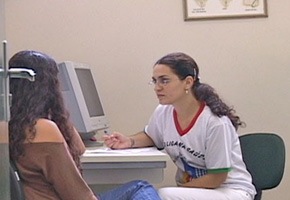

A model that combines orientation with didactic material, doctor visits and telephone follow-ups is being tested by Brazilian researchers
A model that combines orientation with didactic material, doctor visits and telephone follow-ups is being tested by Brazilian researchers.
A model that combines orientation with didactic material, doctor visits and telephone follow-ups is being tested by Brazilian researchers.

A model that combines orientation with didactic material, doctor visits and telephone follow-ups is being tested by Brazilian researchers
By Karina Toledo, Raleigh, North Carolina
Agência FAPESP – Thanks to an educational intervention that combines orientation through didactic material, doctor visits and telephone follow-ups, a group of researchers from the Universidade de São Paulo’s School of Nursing in Ribeirão Preto (USP- Ribeirão Preto), has managed to improve the health of patients with chronic conditions.
The results of the study, conducted under the auspices of a FAPESP Thematic Project coordinated by Professor Lídia Aparecida Rossi, were presented on December 11 in Raleigh, North Carolina, during FAPESP Week.
“As the population ages, the number of people with chronic conditions caused by disease or physical trauma that require constant care for long periods will tend to increase. For this reason, adequate monitoring has been a growing concern in the nursing area worldwide,” explained Rossi.
Several infirmities can be classified as chronic conditions, including Parkinson’s disease, Alzheimer’s disease, diabetes and cardiovascular disease. In Ribeirão Preto, people with cardiopathy and severe burns are being monitored by the Rehabilitation and Quality of Living Research Group, coordinated by Rossi and Professor Rosana Sapdoti Dantas.
The study has engaged a team at the School of Nursing of the Universidade Estadual de Campinas (Unicamp). The team is led by Professor Roberta Cunha Matheus Rodrigues and researchers Marcia Ciol and Jeanne Hoffman, both from the University of Washington in the United States.
“The studies from our group showed that distinct chronic conditions have very similar responses, such as fear, anxiety, depression, reduced self esteem, loss of autonomy, problems adhering to treatment and loss of quality of life,” explained Rossi.
Some of these results were published in the periodicals Disability and Rehabilitation and Revista Brasileira de Saúde Pública.
In a now-concluded FAPESP Thematic Project, the researchers adapted several scales developed for use in other countries to Brazilian culture. The models allow for the evaluation of subjective aspects of individuals with chronic conditions, such as pain-related anxiety, body image and quality of life.
“Currently, these instruments are being used in our studies and by other researchers to measure the results of interventions that aim to increase patients’ adherence to treatment and self-efficacy, which in this case represents the capacity to perform actions to improve health,” explained Rossi.
Motivation
The model of educational intervention adopted by Rossi’s group includes frequent stimuli for self-care over the phone and personal visits from a nurse, during which didactic materials with simple explanations about the disease or condition and the care the patient and his/her family should take are provided.
The impact of the initiative is being evaluated in several dissertations. Under the supervision of Dantas, Flávia Martinelli Pelegrino monitored cardiopathy patients undergoing oral anticoagulation therapy during her doctoral studies.
Compared to the control group, which received standard care from the health institution, the intervention group presented greater satisfaction with the treatment, better quality of life and reduced symptoms of depression and anxiety.
During her doctoral studies under the supervision of Rodrigues, Laura Bacelar de Araújo Lourenço tested the effect of the educational intervention in a group of patients with coronary artery disease. The results indicate a significant increase in treatment adherence – from 32% to 72% – among those who received stimuli for self-care.
In another project under Rossi’s supervision, the strategy was tested in patients undergoing angioplasty for stent placement (steel springs used to open arteries and allow for blood flow). In the group that received the intervention, a significant reduction in anxiety symptoms was observed compared to the control group in an evaluation conducted six months after the procedure. The study is still underway, and the patients continue to be monitored.
“The data related to the intervention conducted in burn patients are still being analyzed. In this case, in addition to scales, we utilize instruments to evaluate the elasticity and viscosity of skin, which allows for indirect measurement of the treatment,” said Rossi.
According to the researcher, the group’s next aim is to identify which aspects of the intervention model contribute to an improved state of health for people with chronic conditions and which aspects have better cost-benefits for health systems.
Down syndrome
During the second day of FAPESP Week, in the same panel dedicated to health sciences, professor Marcia Van Riper from the School of Nursing at the University of North Carolina in Chapel Hill presented the results of a multicentric study, the objective of which was to understand how culture, interaction with the health system and family factors contribute to adaptation and the resilience of families of individuals with Down syndrome.
The study included researchers from the USP’s Nursing Schools in São Paulo and Ribeirão Preto, in addition to scientists from the United Kingdom, Ireland, Portugal and Japan.
The article on the educational intervention model published in Revista de Saúde Pública can be accessed at www.scielo.br/scielo.php?script=sci_arttext&pid=S0034-89102008000400023&lng=pt&nrm=iso&tlng=en.
The articles published in Disability and Rehabilitation can be accessed at http://informahealthcare.com/doi/abs/10.3109/09638280802532555 and http://informahealthcare.com/doi/abs/10.1080/09638280802306257.
Republish
The Agency FAPESP licenses news via Creative Commons (CC-BY-NC-ND) so that they can be republished free of charge and in a simple way by other digital or printed vehicles. Agência FAPESP must be credited as the source of the content being republished and the name of the reporter (if any) must be attributed. Using the HMTL button below allows compliance with these rules, detailed in Digital Republishing Policy FAPESP.




